How would you like it if someone had access to your most private and intimate Whatsapp, Facebook, and Instagram chats?
While that sounds extremely worrisome, it’s actually what’s going on right now, despite what Facebook says.
That’s right – your personal messages and images are being sifted through by thousands of analysts whom Facebook has contracted.
Sounds like something right out of 1984. Well, the fact is, both governments and companies are extremely interested in your communications and personal data.
So, the good news is that you can still take steps to protect your privacy, and that’s by making use of an encrypted messaging app.
In this article
What are encrypted messaging apps?
An encrypted messaging app is similar to other messaging apps like Whatsapp or Line. So, the only difference is that these apps use E2E encryption to protect your messages. You can find the best encrypted and secure messaging apps in the Google Play Store.
What this means is that messages sent via the app cannot be accessed by anyone other than the communicating parties. All of which makes it impossible for eavesdroppers to monitor your communications.
But wait – doesn’t Whatsapp also claim to use E2E encryption?
Yes, it does utilize E2E encryption, but don’t forget that Facebook owns Whatsapp. And it’s actually been proven that Facebook does read your Whatsapp messages.
Hence, this is why privacy-conscious individuals have begun turning away from Whatsapp in favour of other more secure messaging apps.
So, let’s take a look at how you can protect your privacy with these encrypted messaging apps:
1. Telegram
Telegram is a user-friendly and secure private messaging app that is often regarded as the most popular alternative to Whatsapp.
With more than 200 million users and counting, it’s easy to see why Telegram is favoured by so many.
The blog Increditools says that Telegram’s secret chats feature secures your messages and utilizes E2E encryption to prevent eavesdroppers from listening in. And for added security, Telegram voice calls are E2E encrypted by default.
As an added plus, Telegram also allows you to send and receive documents along with a variety of multimedia files.
Pros:
- Large user base
- Compatible with Android, iOS, and PCs
- Can send and receive documents and multimedia files
- User-friendly interface
- Messages can be set to self-destruct
Cons:
- Does not support E2E encryption as a default
2. Signal
The Signal is a free-to-use private messaging app with a number of solid security features.
First of all, I liked how Signal uses open-source encryption, which means that anyone can audit and view its encryption protocols.
Also, you should keep in mind that a number of reputable sources strongly recommend Signal.
For example, whistleblower and privacy advocate Edward Snowden has often spoken highly of Signal and how he uses it as his personal messaging app. Additionally, the U.S. Senate’s sergeant-at-arms has also approved Signal for use by Senate staff members.
And for added privacy, messages sent by Signal are automatically deleted after a preset time. That way, you won’t have to worry about anyone having access to your messages.
Pros
- Endorsed by both Edward Snowden and the US Senate
- Top-tier security features
- Open-source encryption
- Free-to-use
- Compatible with Android, iOS, and PCs
Cons
- Does not support emojis
3. Threema
Three provides you with complete privacy by storing all contact and group information locally on your device.
And for added privacy, messages are automatically deleted after they have been sent.
Additionally, Threema provides E2E encryption for all message types – and this includes group chats, texts, voice calls, and file transfers. All of which ensure that your communications remain consistently private.
Plus, if you want to avoid using your real phone number, Threema gives you the option to log in via a unique 8-digit ID to connect with other users.
Pros
- Compatible with Android, iOS, and PCs
- Based in Switzerland
- E2E encryption for all communications
- Does not require a phone number
- Can verify contacts via QR code
Cons
- Not free-to-use









